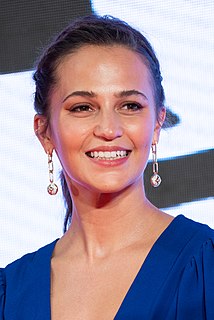A Quote by Julie Delpy
The way I work is that I never let people do an assembly. I don't like it because it shapes the film in a way that I can't really control. To me, editing is making the film and it's a huge process and editors are under-rated.
Related Quotes
In the very beginning, women were editors because they were the people in the lab rolling the film before there was editing. Then when people like D. W. Griffith began editing, they needed the women from the lab to come and splice the film together. Cecil B. DeMille's editor was a woman. Then, when it became a more lucrative job, men moved into it.
You make a film and you can't really pick the way it's put to the public. You control the content, but the way it's marketed, or the poster, or what they're telling the public about the film, it's beyond you. Some people don't even see them, because they think they already know it. That can be frustrating, when something you've done is marketed in a way you think is antithetical to what it is.
There are loads of sociopolitical, racial, class and future-planet situations that really interest me, but I'm not really interested in making a film about them in a film that feels like reality because people view that in a different way. I like using science fiction to talk about subjects through the veneer of science fiction.
I would make a huge distinction between theater improvisation and film improvisation. There isn't much improvisation in film - there's virtually none. The people that theoretically could be good at this in a theater situation don't necessarily do this in a film in a way that will work, because it's much broader on a stage. But in a movie, it has to be real, and the characters have to look entirely real because it's being done as a faux documentary, so there are even fewer actors that can do that on film.
I think these are such different films that it's hard to compare, because with Quentin we were all just like, it was like a party every day, you know, it was like that film was just like silly, it was just really for fun, it was really, it wasn't, you know, to make a huge impact. I t was just we wanted to have fun and go to work every day and do a fun movie. And this is like huge, I mean, this is like huge studio film, there's a ton of action, it's like really hard work.
Hot Fuzz in a strange way, for me, summons up the spirit of watching R-rated films that I was too young to watch. I was 14, 13 maybe, when Robocop came out. Seeing Robocop at my brother's friend's house, and not really supposed to be watching it, because it was [rated] 18 and I was 13. That mind-blowing experience, because not only is it a great film, but it feels illicit.
I find that in the process of making a film you're constantly discovering things that you never even imagined would work at the beginning. Actors come into the film and do things you never even imagined. Production designers come in, the director of photography lights it in a way that you never imagined. So, it's always evolving, always exciting.
Not only do I look at the playback with the actors, but I look at the on-set assembly footage with the sequences with my actors as well. These are the reasons why I take twice as much time to shoot a film in Korea. Thinking back, I remember on my first ever Korean film, I never used any playback or on-set assembly, so all I had to do was to tell myself it's just like making my first ever Korean-language film. After that, I felt right at home.



































